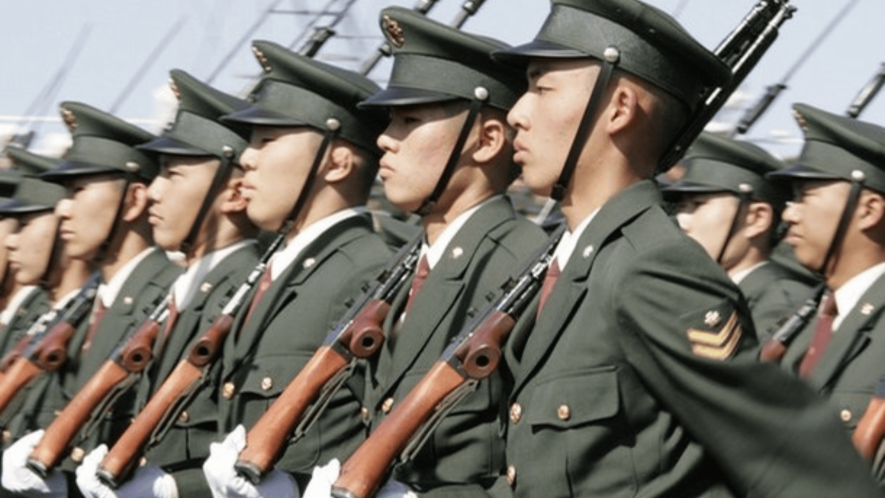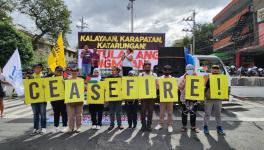Fighting Remilitarisation in Japan

Representational Image. Image Courtesy: Flickr
Seishi Hinada is a National Executive Committee member of ZENKO (National Assembly for Peace and Democracy). ZENKO emerged in 1970 out of the student movement in the 1960s. He joined ZENKO in 1981 as a university student activist in Hiroshima’s anti-nuclear peace movement. The International Strategy Center’s Dae-Han Song and Michael McGrath interviewed Seishi online. The interview has been edited for clarity and brevity.
We began with a brief background on post-World War II Japan, summarised here. According to Seishi, at the root of the Japanese public’s acceptance of the 55,000 U.S. military personnel in Japan, despite the wartime destruction inflicted on Japan by the United States, is a wartime compromise: in exchange for Japan adopting a peace constitution and renouncing war and military force, the United States would absolve it and its Emperor Hirohito for war crimes (i.e., the colonisation of Korea and the invasion of China and other Asian countries).
Likewise, the United States would be absolved of its nuclear bombing of Hiroshima and Nagasaki. The impetus for this collusion “was to make Japan an anti-communist bulwark against the USSR at the time.” According to Seishi, “This complicit relationship between the two countries has caused a lack of a sense of war responsibility among the Japanese general public and a lack of attitude to pursue U.S. responsibility.” Thus, except for those directly impacted by the crimes such as Okinawans, much of the Japanese public are “very lenient about the existence of U.S. military bases within Japan.”
International Strategy Center (ISC): The U.S. is waging a new Cold War against China, and one of the key components of its military strategy is the U.S.-Japan-South Korea trilateral military alliance. In Japan, Prime Minister Fumio Kishida has promised to increase Japan’s military budget by 50% over the next five years. What are the Japanese public’s thoughts around this re-militarisation in Japan?
Seishi: The Japanese government is making the most of the war in Ukraine and the rocket launch by DPRK is getting the general public behind its policy of massive military expansion and acquiring the capabilities to attack foreign bases. Regarding the military buildup by the Japanese government, the general public seems to be in support of those policies, but there are weak points.
When it comes to a tax hike for the sake of military expansion, the approval ratings will drop. So, Kishida cannot talk out loud about the tax hike, and the only option he has left is to cut the budget in every other field: social welfare, health care, education, and the rest of it.
In addition, the Japanese population is shrinking quicker than anticipated. So, the government is asked to take drastic measures to deal with this issue too. But again, they cannot finance it because they allocate a large share of the budget to military expenses.
By exposing these contradictions, more and more people will realise the necessity to radically shift the policy of military alliance and military buildup toward peaceful dialogue and disarmament. The general public’s consciousness is changing. Kishida’s support base is not so strong.
ISC: ZENKO has been fighting against the U.S. military base in Okinawa. What is driving this campaign? Why is ZENKO opposed to Japan’s remilitarisation? What is the role of international solidarity in this struggle?
Seishi: In 1987, Zenko held its annual assembly in Okinawa. Its members visited Okinawa and met survivors of the Battle of Okinawa. We learned from them that the military will not protect civilians. We also met and saw the strong anti-base movement in Okinawa that we couldn’t see in mainland Japan. Since then, we have been in solidarity with Okinawa Islanders’ struggles.
“No More Battle of Okinawa” was formed a couple of years ago when Okinawan activists felt it urgent to stop the militarisation and fortification of the Okinawa Islands. The U.S. and Japan are now talking a lot about the Taiwan emergency, with missiles and war machines deployed to Okinawa Island. The slogan “No More Battle of Okinawa” reflects a sense of this war crisis. They are organising a prefecture-wide organisation to oppose militarisation in Okinawa and promote grassroots diplomatic efforts for peace through dialogue with people in surrounding areas like Taiwan, China, and Korea.
ISC: From the recent international peace conference, it became clear that while Japan is dependent on U.S. military strength, Japan also plays a leading role in the region. Former Prime Minister Abe, in particular, played a key role in creating the concept of a Free and Open Indo-Pacific. What is the current Kishida government’s vision for Japan’s role in the region?
Seishi: Basically, Kishida is following the path set by Abe. Some people emphasise that Japan is still dependent on the U.S. militarily, economically, or politically and is, in a way, a colony of the U.S. However, we should not overlook Japan’s drive to become a military global power. Japan has already built an overseas military base in Djibouti [in] east Africa, in cooperation with the U.S. and [South] Korea. Japan aims to build up its military to protect its vested interests around the globe.
Additionally, Kishida is removing war compensation issues from the agenda and imposing a false solution on Korean War victims. We need to be very careful about what Kishida is doing now.
ISC: What would ZENKO’s alternative vision be for Japan’s role in the region?
Seishi: First, Japan should provide an official apology and compensation to wartime victims, including victims of wartime sexual slavery and Korean workers forcibly mobilised by Japan. Second, Japan should engage in multilateral talks, such as the Six-Party Talks, to resolve… issues [of conflict] through diplomacy and dialogue. ZENKO will support this direction from the grassroots level.
Finally, we should expand international solidarity work among the peoples of the countries concerned and raise our voices against militarisation and the rhetoric of the new Cold War. ZENKO has been actively involved in international solidarity efforts for the past two or three years and plans to resume those activities.
Dae-Han Song is in charge of the networking team at the International Strategy Center and is a part of the No Cold War collective.
Michael McGrath is a freelance journalist living in Seoul and a member of the International Strategy Center.
Source: This article was produced by Globetrotter.
Get the latest reports & analysis with people's perspective on Protests, movements & deep analytical videos, discussions of the current affairs in your Telegram app. Subscribe to NewsClick's Telegram channel & get Real-Time updates on stories, as they get published on our website.
























